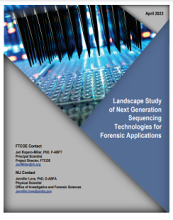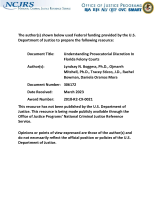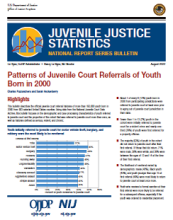Case processing
Case Weighting Systems for the Public Defender - A Handbook for Budget Preparation
Landscape Study of Next Generation Sequencing Technologies for Forensic Applications
Understanding Prosecutorial Discretion In Florida Felony Courts
The Sentinel Role of Forensic Toxicology Laboratories to Identify and Act Upon Diverse Drug Threats by Addressing Toxicology and Economic Demands
Sexual Assault in Alaska
Sexual Violence in Alaska
Findings from the Federal, State, and Tribal Response to Violence Against Women in Indian Country Studies
Courtroom Communities: Criminal Case Processing and Sentencing Reform
The important and influential role of the courtroom community must be considered when developing and implementing future criminal justice reforms.
Youth Defense Delivery Systems and Associated Outcomes
The Evolving Character of Public Defense: Comparing Criminal Case Processing Effectiveness and Outcomes Across Holistic Public Defense, Traditional Public Defense, and Privately Retained Counsel
Assessing the causes of racial disparities in drug courts: An intersectional approach to eliminating barriers to admittance
NIJ Multisite Impact and Cost-Efficiency Evaluation of Veterans Treatment Courts
The Link Between the SAMFE and Police Perceptions of Victim Credibility
Traumatic Incidents and Experiences of Racism and Sexism: Examining Associations with Components of Critical Consciousness for System-Involved Girls of Color
Making Sense of DNA Backlogs - Myths vs. Reality
Pathways to Sexual Assault Case Attrition: Culture, Context, and Case Clearance
Just Science Podcast: Just Key Considerations for Investigations of Sexual Assault Cases
Just Science Podcast: Just the Intersection of At-Home Kits and Healing
Patterns of Juvenile Court Referrals of Youth Born in 2000
Courtroom Communities: Criminal Case Processing and Sentencing Reform
A Landscape Study of 3D Crime Scene Scanning Devices
The Sexual Stratification Hypothesis and Prosecuting Sexual Assault: Is the Decision to File Charges Influenced by the Victim-Suspect Racial-Ethnic Dyad?
Booker and Beyond Analyzing Sentencing Reform and Exploring New Research Directions
This webinar features a discussion of previously published research on the U.S. Supreme Court’s 2005 Booker decision - which effectively transformed the United States Sentencing Guidelines from a mandatory, to an advisory, system. The presentation will address selected research findings from the last 15 years. Individual participants will briefly review their previous research findings with particular attention paid to the analytic methods used.
See the YouTube Terms of Service and Google Privacy Policy
NIJ Multisite Impact and Cost-Efficiency Evaluation of Veterans Treatment Courts, Fiscal Year 2022
Deadline Notice
The deadline for the funding opportunity discussed in this video has passed.
See the YouTube Terms of Service and Google Privacy Policy





